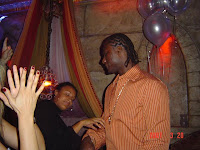The Gasol Trade Anniversary
February 1 is the 2 year anniversary of the trade that sent Pau Gasol to the Lakers for salary cap flexibility. And since I'm bitter and I'll never get over the trade, I thought it made sense to do a post about it.
 | Getting rid of Pau | People forget how badly Grizzly fans wanted to get rid of their best player. Shortly after the trade, we were reminded when Leon Powe dunked on Gasol's head 30 times during the NBA Finals. More recently, Zach Randolph reminded us again by doing what Pau would never do: anchoring the post with toughness, rebounding, and clutch play. Even though we had to watch everybody ogle as Gasol won a championship, we all knew it was worth it. Now that the Grizzlies have turned it around, it's worth even more. |
 | Getting Marc Gasol | Pau's sweet revenge on us is the fact that our new favorite player is his brother. Damn you Gasol! Marc was better than expected as a rookie last year. And after running up a mountain all summer, he's a top five center in the league (Look at John Hollinger's Player Efficiency Rating if you don't believe me.) Even more baffling than Pau's curse against us: the Commercial Appeal reports that we have GM Chris Wallace to thank for the younger Gasol's inclusion in the trade. We love Gasol. Chris Wallace made a savvy move. Next thing you'll tell me is Heisley owns a successful team. |
 | The right to draft Darrell Arthur | Arthur may eventually be a solid backup power forward. So far, injuries have slowed his development. He does offer fans a pleasant reminder of John Calipari's legacy as coach of the Memphis Tigers. I always thought it would be nice if Arthur wore #92 to remind fans that the Tigers were up 9 with 2 minutes left. |
 | Getting Javaris Crittenton | Can you believe there was a time when we thought Crittenton might be the point guard of the future? Wallace once said he was going to lock Crittenton in a room with Kyle Lowry and Mike Conley to see which two emerged as the Grizzlies' point guard tandem. What Wallace did not realize is that Crittenton is not the type of guy you want to lock in a room with two point guards that are playing ahead of him. Since he left Memphis, Javaris has contributed to one of the top five NBA scandals of last decade. (December's gun incident joins the Palace Brawl, the Donaghy scandal on the list.) Crittenton's actions may have a bigger impact on the Grizzlies than you think. The incident may give owners leverage over the players during upcoming negotiations over the Collective Bargaining Agreement. The owners then may be able to work a deal that makes owning a franchise more financially viable. Would that close the competitive gap between small markets like Memphis and big markets like New York? It's pure speculation, but hey, that's why I'm a fan blogger and not Chad Ford. |
 | Getting The Laker's 2010 Draft pick | If the draft were today, the 2010 pick the Grizzlies acquired would be about as bad as it could be. |
 | Getting $3,000,000 | The Grizzlies received cash for their troubles - let's call it $3,000,000. I can't imagine where Heisley could have invested 3 million and made money since 2008. |
 | Getting Kwame Brown | Brown continued a long history of tragic Grizzly big men: Bryant Reeves, Stromile Swift, Ike Austin, Darko Milicic... Am I leaving anyone off the list of Grizzly big men busts who are unintentionally funny? Oh right, Tony Massenburg. |
 | Getting Aaron McKie | It's amazing that a member of the 2001 Eastern Conference Champion Philidelphia 76ers played fewer games as a Grizzly than Allen Iverson. But it's true. Aaron McKie did not play 1 game as a Grizzly. On the plus side, I wasn't duped into buying an Aaron McKie Grizzly jersey. |
 | Losing a 2008 2nd round draft pick | This pick turned out to be Joe Crawford. Chad Ford is reporting the Darko Milicic would have been a steal at this pick. |
So there you have it. Not that I'm bitter or anything and need to rehash what happened two years ago to validate myself. I feel like I may be insane for admitting this in public, but that trade didn't turn out so badly after 1.5 years of torture. It's a good thing I didn't go with my initial reaction of dousing myself with gasoline, setting myself on fire, and jumping off of a bridge.










